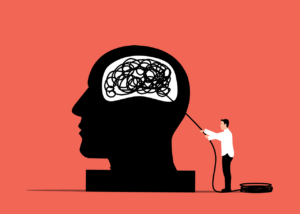WHAT IS VAPING?
Vaping is inhaling a vapor created by an electronic cigarette (e-cigarette) or other vaping device.
HOW DOES VAPING WORK?
E-cigarettes (or “vape pens”) heat a liquid until it becomes a vapor, which is inhaled. The liquid (e-liquid or “vape juice”) can contain nicotine or marijuana distillate or oil. E-cigarettes can be refillable or pre- filled with cartridges containing the e-liquid. The pre-filled e-cigarettes (called “Puff Bars”) are designed for one-time use. After taking a certain number of “puffs,” the user throws the device away.
WHAT ARE THE HEALTH EFFECTS OF VAPING?
The health risks of vaping include:
- ADDICTION: E-cigarettes/vapes contain nicotine, a drug that’s highly addictive. You don’t have to vape every day to get addicted.
- ANXIETY & DEPRESSION: Nicotine makes anxiety and depression worse. It also affects memory, concentration, self-control, and attention, especially in developing brains.
- BECOMING A SMOKER: People who vape are more likely to start smoking regular (tobacco) cigarettes and may be more likely to develop other addictions in the future.
- IMPOTENCE: There is some evidence that vaping can cause sexual dysfunction in men.
- SLEEP PROBLEMS
- EXPOSURE to cancer-causing chemicals
- CHRONIC BRONCHITIS
- LUNG DAMAGE that can be life-threatening. Other health effects are possible that we don’t yet know about. Vaping hasn’t been around that long, soits health risks aren’t all known.
WHY SHOULD I QUIT?
Wanting to be the best, healthiest version of yourself is an important reason to quit vaping. Other reasons include:
- ADDICTION: Addiction in the growing brain may set up pathways for later addiction to other substances.
- BRAIN RISKS: Nicotine affects your brain development. This can make it harder to learn and concentrate. Some of the brain changes are permanent and can affect your mood and ability to control your impulses as an adult.
- USE OF OTHER TOBACCO PRODUCTS: Studies show that vaping makes it more likely that someone will try other tobacco products, like regular cigarettes, cigars, hookahs, and smokeless tobacco.
- TOXINS (POISONS): The vapor made from e-cigarettes is not made of water. The vapor contains harmful chemicals and very fine particles that are inhaled into the lungs and exhaled into the environment.
- SPORTS: You want to do your best in sports, and vaping may lead to lung inflammation (irritation). MONEY: Vaping is expensive! The cost of the cartridges over time starts to add up. Instead, you could spend that money on other things you need or enjoy.
- TO GO AGAINST TOBACCO COMPANY ADVERTISING: Many e-cigarettes are made by the same companies that produce regular cigarettes. Their marketing targets young people by making fun flavours for e-cigarettes and showing young, healthy people vaping. They’re trying to make you their next lifetime customer.
HOW CAN I QUIT?
Hypnotherapy has shown promise in helping people quit vaping. By accessing the unconscious mind, hypnotherapy can help individuals overcome the addiction and challenge the cravings associated with vaping. Through hypnosis, people can develop a new mindset that promotes healthier habits and choices. Hypnotherapy can also help people identify and address any underlying emotional issues that may be contributing to their addiction.
According to a study published in the International Journal of Clinical and Experimental Hypnosis, hypnotherapy is an effective tool for smoking cessation. The study found that smokers who underwent hypnotherapy were more likely to quit smoking than those who did not. This suggests that hypnotherapy will also be useful for quitting vaping as they share similar aspects, namely addiction and smoking-related behaviours.
Hypnotherapy aims to address the root causes of addiction and rewire deeply ingrained patterns of behaviour. Hypnotherapy can be an effective tool for quitting vaping because it addresses addiction at its core, focusing on the underlying psychological factors that drive the behaviour.
- Decide why you want to quit and write it down or put it in your phone. Look at the reason(s) when you feel the urge to vape.
- Pick a day to stop vaping. Put it on the calendar and tell supportive friends and family that you’re quitting on that day.
- Get rid of all vaping supplies.
- Understand withdrawal. Nicotine addiction leads to very strong cravings for nicotine. It can also lead to:
- headaches
- feeling tired, cranky, angry, or depressed o trouble concentrating
- trouble sleeping
- hunger
- restlessness
The signs of withdrawal are strongest in the first few days after stopping. They get better over the following days and weeks.
Get ready for feelings, people, and places that make you want to vape. If possible, avoid places and people that trigger the urge to vape. If you feel the urge to vape, try these things instead:
- Chew sugar-free gum or drink water.
- Text, call, or hang out with a friend who will support you.
- Listen to your favourite playlist.
- Go for a walk or jog.
- Try yoga or meditation.
- Take 10 deep breaths.
- Keep your hands busy with a hobby, like drawing or making jewellery.
- Go somewhere where smoking/vaping isn’t allowed.
WHEN SHOULD I CALL THE DOCTOR?
Call your doctor right away if you vape and have:
- coughing, shortness of breath, or chest pain
- nausea, vomiting, or diarrhoea
- tiredness, fever, or weight loss
The above article was medically reviewed in July 2022 by Dr. Amy W. Anzilotti, MD





